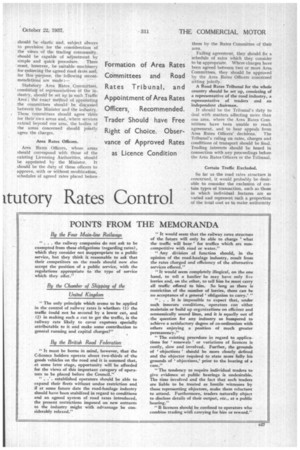POINTS FROM THE MEMORANDA
Page 61

If you've noticed an error in this article please click here to report it so we can fix it.
By the Four Main-line Railways " . . . the railway companies do not ask to be exempted from these obligations (regarding rates), which they consider not inappropriate to a public service, but they think it reasonable to ask that their competitors on the roads should now also accept the position of a public service, with the regulations appropriate to the type of service which they offer."
By the Chamber of Shipping of the United Kingdom
" The only principle which seems to be applied in the control of railway rates is whether: (I) the traffic tould not be secured by a lower cut, and (2) its making such a cut to get the traffic, is the railway rate likely to cover expenses specially attributable to it and make some contribution to general running and capital charges?"
By the British Road Federation "It must be borne in mind, however, that the C-licence holders operate about two-thirds of the goods vehicles on the road and it is assumed that, at some later stage, opportunity will be afforded for the views of this important category of operators to be placed before the Council."
" . established operators should be able to expand their fleets without undue restriction and if at some future date the road-haulage industry should have been stabilized in regard to conditions and an agreed system of road rates introduced, the present restrictions imposed on new entrants to the industry might with advantage be considerably relaxed." " It would seem that the railway rates structure of the future will only be able to charge what the traffic will bear' for traffics which are noncompetitive with road or water."
"Any division of function should, in the opinion of the road-haulage industry, result from the rates charged and efficiency of the alternative services offered."
"It would seem completely illogical, on the one hand, to tell a haulier he may have only five lorries and, on the other, to tell him he must carry all traffic offered to him. So long as there is restriction of the number of lorries, there can be no acceptance of a general obligation to carry.' " t• . . It is impossible to expect that, under such insecure conditions, operators can either maintain or build up organizations on efficient and economically sound lines, and it is equally out of . the question for any industry so hampered to achieve a satisfactory degree of co-ordination with others enjoying a position of much greater permanency."
" The existing procedure in regard to applications for renewals ' or variations of licences is costly, slow and involved. Further, the grounds of 'objections' should be more closely defined and the objector required to state more fully his grounds of objections,' prior to the hearing of a case."
"The tendency to require individual traders to give evidence at public hearings is undesirable. The time involved and the fact that such traders are liable to be treated as hostile witnesses by those representing objectors, make them reluctant to attend. Furthermore, traders naturally object to disclose details of their output, etc., at a public hearing."
"B licences should be confined to operators who combine trading wita carrying for hire or reward."
























































































































